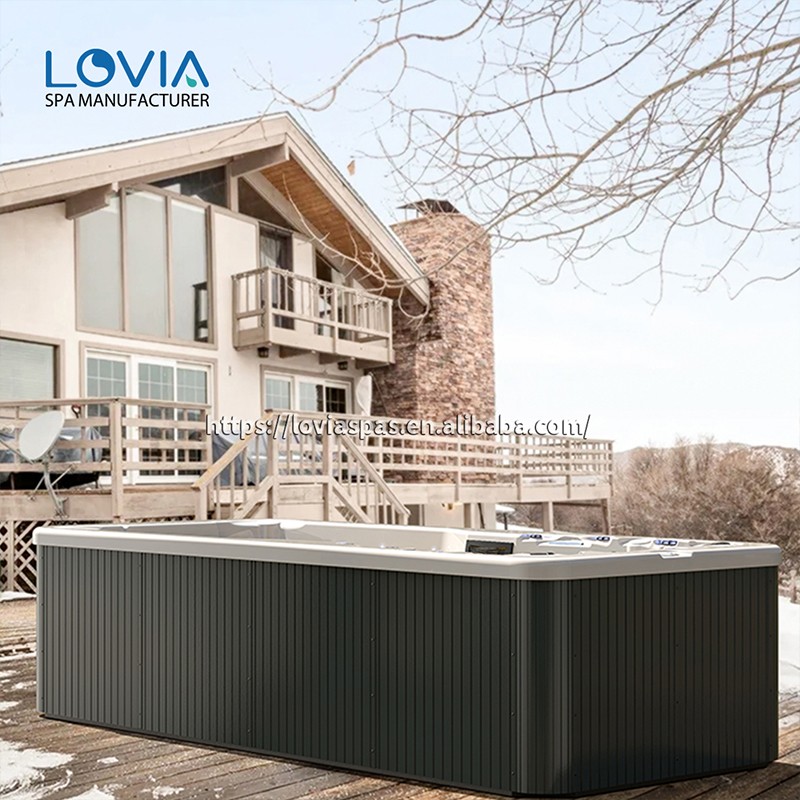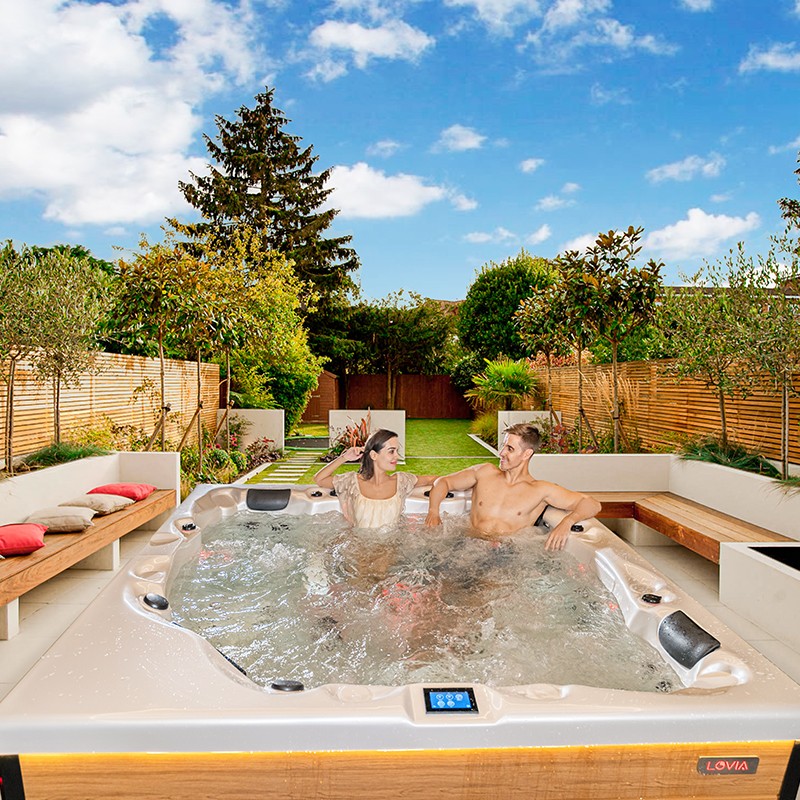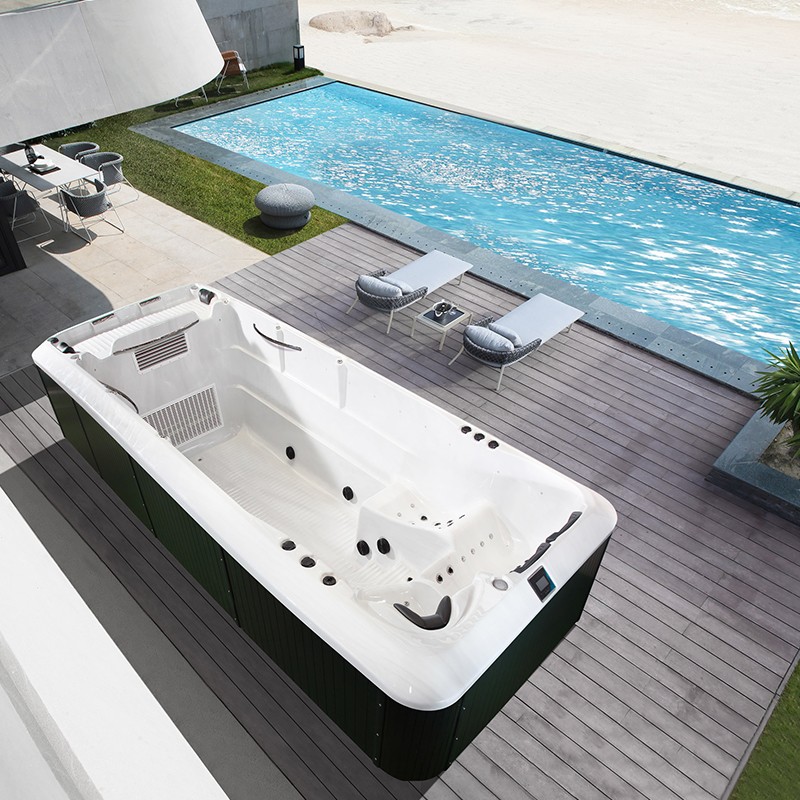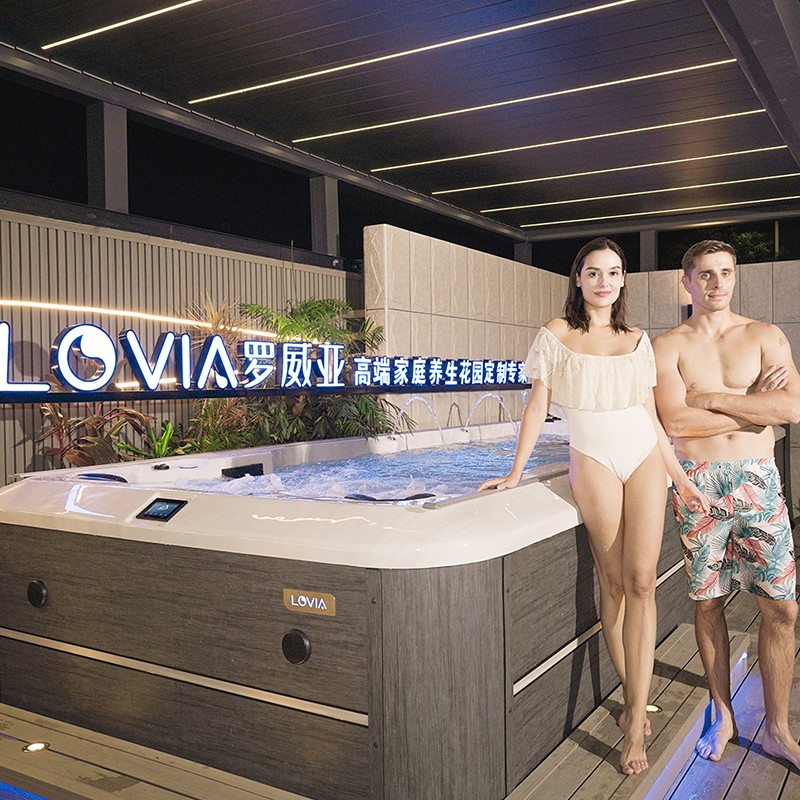
Can hydro swim spa tub be filled with rain and snow?
2025-07-15 15:35As a high-end bathroom product that integrates swimming, massage and spa, hydro swim spa tub has gradually entered more and more homes and high-end clubs due to its diverse functions, convenient use and high health value.
Regarding its use in special weather conditions, such as rainy and snowy days, many users have doubts: Can hydro swim spa tub be used on rainy and snowy days? Can the bathtub be filled with rain and snow?
This article will systematically and in-depth discuss this issue from the aspects of structural safety, comfort of use, water quality management, electrical system protection, energy efficiency, health and hygiene, and equipment life.

Structure and operation mechanism of hydro swim spa tub
Before discussing the feasibility of use in special weather, it is necessary to understand the basic structure and operation principle of hydro swim spa tub. Hydro swim spa tub is different from ordinary bathtubs. It usually has the following core parts:
· Tank structure: Made of high-strength fiberglass or acrylic composite materials, with a smooth and corrosion-resistant surface.
· Constant temperature heating system: The set water temperature is maintained through an electric heating device or a heat pump system to ensure that users can use it comfortably even in a cold environment.
·Massage system: It has multiple built-in spa nozzles, which use high-pressure water and air to massage the body, relax muscles and promote blood circulation.
·Circulation filtration system: Ensure the cleanliness of water and prevent the growth of bacteria and impurities.
·Electrical control system: It includes control panel, sensors, heaters, pumps, circuit protection devices, etc., which are the nerve center for the stable operation of hydro swim spa tub.
Based on these complex structural designs, we can further analyze whether it is safe, reasonable and efficient to use hydro swim spa tub on rainy or snowy days.

Can hydro swim spa tub be used on rainy days?
1. Electrical safety
Hydro swim spa tub relies on electricity to operate. The biggest potential risk on rainy days is short circuit or leakage of electrical system. In the design of high-quality spa bathtubs, all electrical systems adopt IPX5 and above waterproof structure. The control panel and heating pump are usually equipped with multiple protective shells and a leakage protection switch (GFCI), which can immediately cut off the power when a small current leakage is detected to prevent the risk of electric shock.
Conclusion: Under the premise that the product installation is in compliance with the standard, the protection level meets the standard, and the power supply system is safe, the use of the hydro swim spa tub in rainy days can be guaranteed in terms of electrical safety.
2. Operation comfort and physical experience
Although the bathtub can be operated outdoors, raindrops will fall directly on the human body or the water surface, causing discomfort during use. For example:
·Rainwater is cold, which may reduce the water surface temperature and affect the load of the constant temperature system.
·Raindrops impact the skin and cause irritation, interrupting the relaxation state.
·It may be accompanied by wind and low temperature, increasing the feeling of coldness.
Under such weather conditions, if equipped with a canopy, bathtub cover or closed pavilion structure, it can effectively improve the comfort of use.
Conclusion: From the perspective of physical sensation, if there is no appropriate shielding measures, it is not recommended to use it in moderate and heavy rain; but if the environmental facilities are complete, it can continue to be used in light rain.
3. The impact of rainwater on water quality
Although rainwater is a natural water source, it is often mixed with pollutants such as dust, acidic substances, and bacteria in urban environments. If you enter the hydro swim spa tub directly, the following problems will occur:
·Affecting the pH value, making the water acidic and accelerating pipe corrosion.
·Reducing water clarity and increasing the burden of disinfection.
·Increasing the risk of bacterial growth.
Although high-end bathtubs have filtering and disinfection functions, such as ozone generators, ultraviolet sterilization, microfiltration devices, etc., they cannot be completely relied on to eliminate all external rainwater pollution.
Conclusion: Rainwater must be avoided from being directly injected into the tub. It is strongly recommended to cover the water cover before use on rainy days, or to replace part of the bath water after rain to maintain water quality.

Can hydro swim spa tubs be used on snowy days?
1. The impact of cold environment on equipment performance
Low temperature will increase the burden on the heating system and insulation system. If a bathtub of poor quality is used, the following problems are particularly prominent on snowy days:
·The heating time is extended and the energy consumption increases significantly.
·Poor insulation, the equipment may be short-circuited due to internal condensation water.
·The pump and nozzle are at risk of freezing and cracking, especially when the power is off or not in operation for a long time.
To this end, many professional hydro swim spa tub brands have designed the following solutions:
· Thick insulation material (such as PU foam) covers the entire tub;
· Water pumps and pipes have electric heating protection function;
Low temperature automatic protection system, which starts the insulation cycle when the temperature is too low to prevent freezing.
Conclusion: Hydro swim spa tubs can be used safely on snowy days, provided that the product design is perfect and the frequency of use is reasonable.
2. Human comfort and health impact
The temperature on snowy days is usually below 0℃. The temperature difference is too large when people enter and exit the bathtub. If the protection is not appropriate, it may cause colds, dizziness, and blood pressure fluctuations. The correct way to use it should include:
· Make adequate warm preparations before entering the bathtub, such as warm-up exercises and wrapping the body with a dry towel.
· Dry quickly after getting out of the bath and enter the room to keep warm.
· The water temperature should not be too high (recommended to be around 38℃) to avoid drastic expansion of blood vessels.
In addition, the ground around the bathtub should be anti-slip to avoid slipping caused by snow accumulation.
Conclusion: Users need to strictly control the process of entering and exiting the bathtub and ensure the safety of the environment around the bathtub.

Can rainwater and snowwater be used to fill a hydro swim spa tub?
This is another common question from users. In response to calls for environmental protection and energy conservation, some users consider using natural rainwater or snowwater to fill a bathtub. However, from a professional perspective, this approach has significant problems.
1. The quality of rainwater and snowwater is unstable
Although rainwater and snowwater are essentially distilled water, they have been in contact with the air before landing and carry a variety of pollutants. Urban rainwater and snowwater often contain:
· Acidic substances (SO₂, NO₂, etc. form acid rain);
· Industrial dust and heavy metals;
· Bacteria, fungal spores, pollen;
· Particle impurities and odor molecules.
Using this type of water source directly for a hydro swim spa tub has the following risks:
· Corrosion of the tank and pipes;
· Reduced hydrotherapy effects;
· Harm to skin and respiratory health;
· Increased disinfection burden and reduced equipment life.
2. Excessive treatment costs
If you insist on using rainwater and snowwater as a supplementary water source, you must go through the following treatment processes:
· Preliminary filtration (remove large particles of impurities);
· Sedimentation disinfection (bleaching powder or ultraviolet sterilization);
· pH adjustment (using baking soda or acid-base regulator);
· Temperature preheating (avoid cold water shock system);
· Hardness adjustment (prevent scale from clogging the nozzle);
The equipment and costs required for these processes far exceed the use of tap water or dedicated water sources.
3. Affecting the life of the heating system
Unsoftened water (such as snowwater) often has high hardness and contains calcium and magnesium ions, which can easily form scale on the inner wall of the heater, resulting in:
· Decreased heating efficiency;
· Increased power consumption;
· Damage to the heating element;
· Repair or replacement is required in a short time.
Conclusion: Rainwater and snowwater should not be used directly to fill the hydro swim spa tub unless it has been purified and treated by the system. For most users, this method is neither environmentally friendly nor economical.
From the above analysis, it can be seen that the hydro swim spa tub can be used in rainy and snowy days in theory, but several prerequisites must be met:
1. The product itself is of high quality and has complete electrical protection, heating and insulation, and automatic protection functions;
2. The use environment is reasonably arranged, and there should be a cover structure, non-slip floor, drainage design, etc.;
3. The user operates properly, including temperature control, body warmth, and timely water quality change;
4. The water source should be purified water or municipal water supply, and it is strictly forbidden to use untreated rain and snow water directly into the bathtub.
In other words, the hydro swim spa tub can be used on rainy and snowy days, but certain conditions are required to ensure safety and comfort; and using rain and snow water to fill the bathtub is not recommended from the technical and safety level, which violates the original intention of the high quality and high requirements of the hydro swim spa tub.
How large is your manufacturing facility?
Our manufacturing facility in Guangzhou covers an area of approximately 45,000 square meters. This large-scale factory supports production capacity to meet both small and large volume orders efficiently. With over 200 skilled workers and more than 20 industry experts, we maintain strict quality control and rapid production cycles. Our factory’s size and manpower allow us to offer competitive prices on high-quality spa products, making us a leading spa supplier and manufacturer in China.
